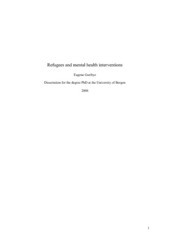| dc.contributor.author | Guribye, Eugene | |
| dc.date.accessioned | 2009-10-26T11:52:50Z | |
| dc.date.available | 2009-10-26T11:52:50Z | |
| dc.date.issued | 2009-05-11 | eng |
| dc.identifier.isbn | 978-82-308-0807-8 (print version) | eng |
| dc.identifier.uri | https://hdl.handle.net/1956/3575 | |
| dc.description.abstract | This thesis focuses on refugees and mental health interventions. A literature review and 24 months of participant observation among Tamil refugee parents in Norway form the basis of the findings presented here. The first study is concerned with refugees and public mental health services in Norway. Many refugees may have difficulties trusting professional helpers within the bureaucratically organized public health care system, replacing these services with relationships to other refugees from their home country. Refugees may also have negative perceptions of mental health institutions in the home country. At the same time, the qualities of mental health services in Norway are not found to be adequate for the particular demands of refugees. There is a lack of systematic routines for securing adequate communication between providers and users. There is also a tendency to group all refugee clients into one artificial and homogenous cultural category which may influence diagnosis, treatment programmes and compliance. Low threshold mental health services are available to refugees, but these are under-utilized by refugees. The second and third studies investigate practices among refugee families for consulting other sectors outside public health services. Tamil parents have established social arenas in which they may generate stabile social networks and cooperate to tend to the well-being of Tamil children. Resource persons within the Tamil community also draw Norwegian resource persons into their agendas. Focusing on preventive measures, the achievements of Tamil children in educational institutions is monitored, and additional tuition is organized to improve their opportunities for access to higher education and relevant employment. Collective trauma is transformed into a social resource motivating social engagement and voluntary effort in both home- and host country. These practices were highly dynamic social processes, responding to the social contexts they occurred in, and subject to constant negotiation. | en_US |
| dc.language.iso | eng | eng |
| dc.publisher | The University of Bergen | eng |
| dc.relation.haspart | Paper I: Norsk tidsskrift for migrasjonsforskning 9(1), Guribye, E.; Sam, D. L., Beyond Culture: A Review of Studies on Refugees and Mental Health Services in Norway, pp. 81-100. Copyright 2008 Tapir Akademisk Forlag. Full text not available in BORA. | eng |
| dc.relation.haspart | Paper II: Guribye, E.; Oppedal, B.; Mjeldheim, G. S.; Sam, D. L., 2009, Collective Coping Strategies among Tamil Refugee Parents in Norway. Full text not available in BORA. | eng |
| dc.relation.haspart | Paper III: Guribye, E., 2009, Turning Points: Trauma as Resilience among Tamil refugee parents in Norway. Full text not available in BORA. | eng |
| dc.title | Refugees and mental health interventions | eng |
| dc.type | Doctoral thesis | |
| dc.rights.holder | Eugene Guribye | eng |
| dc.subject.nsi | VDP::Samfunnsvitenskap: 200::Psykologi: 260::Sosial- og arbeidspsykologi: 263 | nob |
